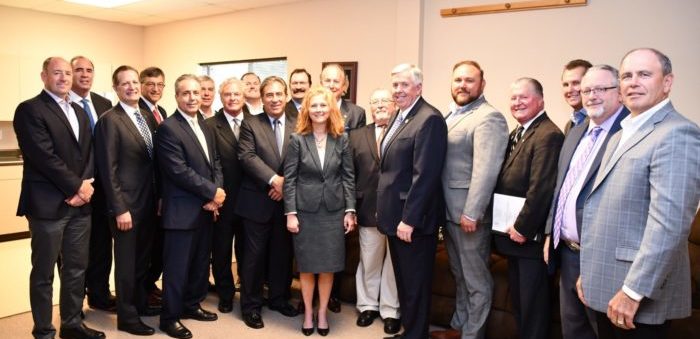In early August, Missouri Port Authorities collaborated to discuss a plan for statewide initiative that focuses on innovative inland waterway container-on-vessel freight service. The gathering focused on finding additional options to transport freight along the inland waterways and how the existent waterway vessels could transport larger volumes of goods and commodities.
The meeting was led by Missouri Governor Michael Parson, who visited the Mississippi River town of Herculaneum, joined by a group of Missouri lawmakers, Jefferson County elected officials, representatives from the port authorities of Jefferson County, Kansas City and Jefferson City, and others.
The participants were informed that the Container-On-Vessel (COV) service will reduce freight transportation costs and increase the efficiency and reliability of shippers.
As Governor Parson commented during the meeting
If you really look at Missouri and look at the ports we have running down both sides of the state … and you look at our highway system going north, south, east and west … we have the ideal, prime location in Missouri to capture these kinds of investments in our state.
In the meantime, Mary Lamie, Executive Vice President of Multi Modal Enterprises at Bi-State Development highlighted the expectations for freight volume to rise by 40% in the following three decades. She continued that following the plan of transporting additional goods and commodities, seasonal furniture, appliances, construction material like ceramic tiles, various other imports and exports and containerized soybeans could be moved. ‘Refrigerated products like beef and pork may also be an option.’
Lamie aims to boost freight connectivity in the inland waterways, following the new plans; Thus she has been engaged on the COV effort, and recognized the need to partner with sister cities like Kansas City and Jefferson City within the State of Missouri, as well as with ports in the State of Louisiana and with IDOT, MoDOT and the U.S. Department of Transportation to help advance the idea.
Concerning Missouri DOT, the US announced in late July, that Missouri DOT will be awarded $81.2 million in INFRA funds to complete two critical upgrades along I-70. Whereas the Mississippi Department of Transportation will be awarded $52.4 million to complete the Appalachian Development Highway System (ADHS) in Mississippi.
[smlsubform prepend=”GET THE SAFETY4SEA IN YOUR INBOX!” showname=false emailtxt=”” emailholder=”Enter your email address” showsubmit=true submittxt=”Submit” jsthanks=false thankyou=”Thank you for subscribing to our mailing list”]
Moreover, during the meeting, Sandy Sanders, Executive Director of the Plaquemines Port Harbor & Terminal District, where the Gateway Terminal for the new COV service would be developed, provided additional insight on those opportunities. He further noted that given that the Gateway terminal will be able to host a 20,000 TEU vessel and connect with all means of transportation in the Midwest, it will provide plenty options to cargo owners on transporting their cargo.
Sal Litrico, Chief Executive Officer, American Patriot Container Transport LLC (APCT) discussed COV as a necessary change to bring added value to the supply chain, creating a new, lower cost transportation option for Midwest cities. Therefore, the vessels APCT is currently developing, will be able to transfer big quantities of containerized freight at more rapid upriver speeds on an all-water route, connecting Missouri ports in Jefferson City, Kansas City and the St. Louis region to the lower Mississippi River — and ultimately to Asia, Europe and other foreign ports.
APCT opted for Kansas City and Jefferson City as port calls of the Missouri River, as well as a potential location in Jefferson County at Herculaneum.
Litrico commented that the diligence process began and is planned to be completed by March 2020, while the operational date is set as March 2022. In regard to the high-water events the Midwest faced in 2019 and other historical high water events and the disruptions that could impact COV operations, Litrico said there were many lessons learned, and adjustments to terminal and intermodal plans to ensure reliable operations are being considered.




























































